For Richmond’s police chief in 2004, the impact of the opening of the River Rock Casino and Resort was immediately obvious.
“I am worried the monster is growing. Their influence will soon control B.C. gaming,” wrote Richmond RCMP Officer in Charge Ward Clapham in an email to his district commander in December 2004.
However, it is questionable if local bureaucrats and politicians saw things the same way, based on testimony Clapham provided Tuesday to Justice Austin Cullen at the Commission of Inquiry into Money Laundering in B.C.
By 2005, Clapham’s investigators had intelligence on kidnappings, extortion, assaults and loan sharking by patrons at the River Rock. Meanwhile, illegal casinos were sprouting up in the city, which was attracting organized criminals from outside the region, the commission heard.
But Clapham told Cullen he was met with “friction” at the City of Richmond when he requested more money to police the casino. (He acknowledged provincial and federal RCMP units had similar responsibilities).
Clapham related how city officials initially consulted his department when Great Canadian Gaming Corp. was proposing the new casino around 2002.
“I made no assurances that crime and or issues would not occur but was willing to work with them at the time,” said Clapham, adding gambling revenue was to be dispersed to the city, which gave him “comfort” politicians would adequately fund any needs that arise.
“There are times I was told certain money was put to our overall budget,” he said.
Since 2000 the city has received over $246 million from River Rock. It has allocated about $8.5 million to four additional RCMP officers since 2007 as a response to casino-related crime concerns.
“By 2005 I don’t think anyone could have predicted what we saw,” he said.
Clapham began making infrequent foot patrols of the casino at the time. On one of those patrols, a senior executive at Great Canadian approached him, he said.
“I was told it was bad for business to have uniformed police officers walking in the casino.”
Clapham said his response was “diplomatic,” and that he continued his foot patrols.
“It was interesting when we were met at the door, we were asked,‘Why were you here and what are you doing here?’”
But the force was so underfunded at the time, he couldn’t maintain a round-the-clock presence. He said a uniformed presence “guaranteed” no one would walk in with drug money in the form of bags full of $20 bills.
Clapham asked the City of Richmond in 2005 for more officers but his request was denied. Two years later, 24 new officers were approved to make up for the deficiencies elsewhere in the city, documents show.
Outside of the city’s control, Clapham also met resistance to the formation of an integrated, regional casino enforcement unit for the RCMP. It is not clear from his testimony how the proposal failed. Clapham said he had even promised colleagues resources and officers from within his detachment.
“We had both illegal gaming houses and the legal gaming casino” to deal with, he told Cullen. “These criminals cross the lines between the two.”
He was asked whether a dedicated casino team would help solve the problem.
“Yes,” he said. “I was hoping this unit would have been approved and in place. I was running into significant friction with the City of Richmond.”
Then, as now, Richmond’s mayor was Malcolm Brodie, who could not be immediately reached for comment.
Brodie has previously stated he was one on council to initially voice concerns about the new casino.
Great Canadian became his single, largest campaign donor between 2012 and 2017.
This year, before the COVID-19 pandemic struck, the city budgeted for $14.5 million from casino revenues and allocated $730,000 to the four extra officers.



